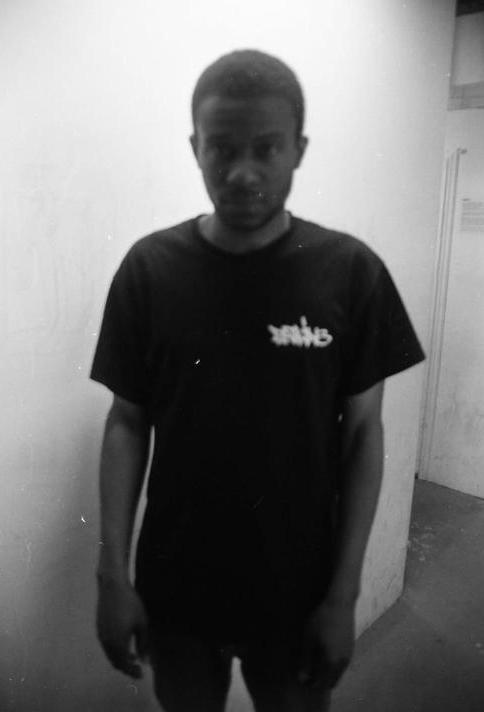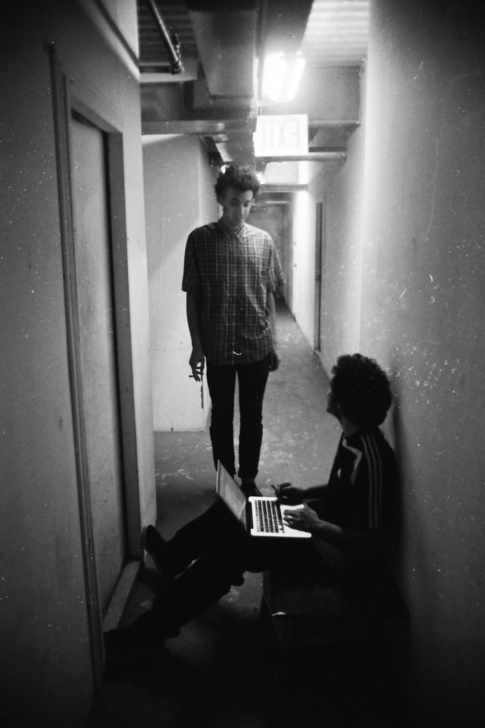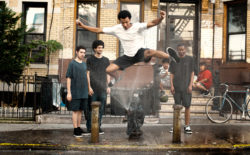Fresh from their tour with Death Grips and the release of November’s critically lauded EP Wiki’93, art-rap provocateurs Ratking form part of a new generation of pioneering indie rappers frustrated with the current state of hip-hop.
Now a trio following the departure of co-producer Ramon, the Manhattanites are passionately opposed to the lyrical cliché and mass trend-conformity they feel is blinkering the genre’s progressive instincts, at a time when hip-hop, like rock before it, is sinking ever deeper into an epidemic of retro-ism. Specifically adoration for the ’90s golden age. With a view to transcending the hollow, shallow plasticity of nostalgia, Ratking are applying hipsterism’s recombinant techniques to hip-hop, splicing the aesthetics of two often starkly disparate acts in the hope of creating a third hip-hop entity – something new.
It’s as good a plan as any for devising a form of the genre without precedent. What could just as easily be viewed as a product of Manhattan’s compressed multiculturalism, as opposed to hipster triteness, Ratking’s merging of bohemian shock art and the darkest sections of Big Apple hip-hop is, despite being achieved through the means of synthesis, their attempt to create a “new authenticity”; the new “real hip-hop”. Because, as the trio are at pains to assert, in a genre that began as an avant-garde underground art movement, experimental visions of hitherto unknown forms is authenticity.
Squired by producer Eric ‘Sporting Life’ Adiele and fronted by MCs Hak and Patrick ‘Wiki’ Morales, Ratking are very much part of the greater New York tradition. They’re also flame-bearers of the city’s idea-trading interaction between bohemian art brut and revolutionary hip-hop – tokened by the avant-shock stylings of Public Enemy, or moreover, everything from Dälek to Def Jux to Blondie’s ‘Rapture’ to Public Enemy’s collaboration with Sonic Youth on ‘Kool Thing’. Speaking here with the feverishly idea-driven Sporting Life, if Adiele’s restlessly searching mind is in any way typical of Ratking’s collective mentality, then here is an act who will be surprising us for years to come. A double helix of production ideas and conceptual ones, Ratking have the potential to be amongst the most important acts in the history of indie rap.
 How did the four of you get together?
How did the four of you get together?
“Two years back I was at this block party downtown, and this kind of…rapping New York Bart Simpson blagged his way on stage and immediately starting killing it. The beat ended and the kid’s still going off and when he ended the whole room was in shock. It’s not often you’re literally taken aback. So after, I go up to the kid and I say to him, ‘I make beats, you’re not corny – we should work together.’ That was Wiki.”
Then what happened?
“Well I liked that Patrick wasn’t obsessed with ‘making it’ – all self-hyping and desperate to make a name for himself, like every other teen rapper I’ve met. He isn’t corny in that way. He’s kind of ‘slacker’. And as a consequence, like me he was keen to define Ratking and develop conceptually before we even started making the music and taking the act live. So the first thing we did was start planning. Our initial idea was ‘Suicide-meets-Wu Tang’, but once we had that as a foundation we then sat down and tried to identify what connects Suicide and Wu Tang – what the point of convergence is….because no matter how antithetic the two acts seem on the surface, there always an ideological point of convergence. So what, artistically, forms that undiscovered space between New York’s late 70s art movement and mid-90s rap? If you think about it, it’s RZA. Between a noise band and hip-hop is GZA’s Liquid Swords.
 “From there we began looking at what connected Cam’ron and [millennial no wave act] Black Dice, or say Animal Collective and Zomby’s Where Were You In ’92?, and so on…because beneath the sonics are the ideas that connect everything in art, and it’s ideas that are going to finally move hip-hop forward again, into the future, in this day and age of creative inertia. That’s ‘real’ hip-hop, by our estimations. Right now we don’t need hip-hop artists, we need the process in reverse: we need thinkers who are willing to take chances, and whatever they make will be hip-hop. We also should be thinking of hip-hop as it was in the beginning – just another form of electronica the same as techno or jungle or UK ‘ardcore. Consider that at the same time Mobb Deep were making their music in New York, Shy FX was making his in London, and there were commonalities between the two. That precise line that divides two artists is where Ratking want to be. We approach it like, OK what is the baby of these two acts?”
“From there we began looking at what connected Cam’ron and [millennial no wave act] Black Dice, or say Animal Collective and Zomby’s Where Were You In ’92?, and so on…because beneath the sonics are the ideas that connect everything in art, and it’s ideas that are going to finally move hip-hop forward again, into the future, in this day and age of creative inertia. That’s ‘real’ hip-hop, by our estimations. Right now we don’t need hip-hop artists, we need the process in reverse: we need thinkers who are willing to take chances, and whatever they make will be hip-hop. We also should be thinking of hip-hop as it was in the beginning – just another form of electronica the same as techno or jungle or UK ‘ardcore. Consider that at the same time Mobb Deep were making their music in New York, Shy FX was making his in London, and there were commonalities between the two. That precise line that divides two artists is where Ratking want to be. We approach it like, OK what is the baby of these two acts?”
So you like to begin from a starting point of formalism and then subvert it.
“Yeah, man. Rip it up and start again, y’know? Our working method consists of ensuring we are steeped in study and tradition, before then mixing everything up by jamming on these different elements. That creates, like, ‘future-knowledge’.”
Obviously there’s a real art vibe to Ratking, even in terms of the films and books referenced and the aesthetic of your videos. There’s kind of a Richard Kern/Trash thing going on with ‘Comic’ and ‘Pretty Picture’.
“The most serendipitous aspect of meeting the rest of the band has been our shared interest in the no wave era, and how the artists of that time shaped New York. For example, Wiki’s mad into James Chance while Hak and I are into no wave film. It means we can bounce ideas off each other, or together try to transfer ideas from no wave to hip-hop.”
Use arrow keys to turn pages (page 1/2)
I read that Wiki’s into Kurt Vonnegut. Miraculously his rapping is able to invoke Vonnegut’s style.
“Yeah, I mean it’s bullshit that people have labelled Ratking ‘little kid rap’. What Wiki and Hak are spitting is beyond. Wiki’s talked about structuring the new album like Vonnegut’s book Breakfast Of Champions; the plan being that we would be, as Vonnegut said were his intentions for the book, clearing our heads of the trash in there. Then there’s also the influence of like…have you ever see Harmony Korine’s films? That non-linear structure thing? Gorillaz do that really well, in fact.
Yeah, it’s like in the British post-punk era, when you had bands converting art ideas into sonic form. Songs like Gang Of Four’s ‘Anthrax’ were an attempt to repurpose Godard’s split-screen ideas.
“Exactly. We were really happy with ‘Comic’ because we tried this cut-up collagist thing with the intro/lead-up. There’s this discourse at the beginning of the song, like a kind of postmodern conversation, where lyrics from Cam’ron’s S.D.E. are ‘talking’ with Fugazi quotes or the writings of [New York graffiti artist] ESPO. Then there’s some of the slower songs, where the loops are designed to sound like a film jumping. That type of thing is where we want to go.”
While like many hip-hop acts today, Ratking romanticise the 90s, the difference seems to be that you romanticise the era not for the sonics but rather as a time when, so to speak, art grew from life.
“Yeah it’s like…back then people didn’t make the hip-hop as much as hip-hop made the people. I mean, hip-hop’s a sinking ship precisely because you can’t recreate the 90s. It’s a dog chasing its tail. You cant recreate the era’s social environment, or bring back the rappers and how they were thinking at the time, as young men and woman. You just can’t. I mean, we’re all nostalgic for the 90s. And with your music you can go back there. That’s easy. But you can’t stop there, conceptually speaking. I dunno…there just isn’t a current hip-hop act in America right now that we feel an affinity with. I mean, sometimes I’d like to ask someone like [writer] Malcolm Gladwell whether Ratking should even be doing music, or is there another more vital, progressive form of artistic expression we should be doing?”
Wiki’93 is a very New York record. There’s a real sense of vertical space and sensory stimulation and hyper-kinetic movement. Do you feel New York has imprinted on your sound?
“Yeah…I dunno. New York, man…its like that ill E.B White quote. I dunno how you’d go even about intentionally capturing New York on a record, but I suppose on Wiki’93 it’s all about how we’re actually living, here in Manhattan. There’s a Joe Strummer quote that goes, ‘Like trousers, like mind.’ Meaning, how you live is what you’ll make. That’s what we think makes you an artist. At the moment so many New York rappers are doing Miami trap rap, sounding either like Rick Ross or in other cases, Chicago – the Chief Keef thing. You’ve got dudes in Staten Island making trap and rocking ‘shirt off’! What the fuck is that about?! It’s cold in New York, man. But more importantly, those Staten trap tracks may sound dope sonically, but there’s a whole other part missing; call it a resonance or a taste of the habitat. It’s not how they’re living. Now, there is something somewhere that connects Miami and New York, but no one in rap is interested in working that kind of thing out.”
 Wiki’93 seems in part an attempt to make hip-hop specifically of the post-net age, while the production is designed to capture the accelerated and overloaded nature of every day life in the net age.
Wiki’93 seems in part an attempt to make hip-hop specifically of the post-net age, while the production is designed to capture the accelerated and overloaded nature of every day life in the net age.
“I mean yeah, it again comes back to Ratking’s exploration of what it is to be a true artist today, or more specifically the conceit that it’s increasingly difficult to be an artist. The problem today is, there’s less of a gap between how an artist lives and the guy at Chase Manhattan bank. The reason being that, while before those lifestyles were very distinct, now…well both these people have iPhones…you see what I’m saying? With equal access to the same internet – this same portal for cultural information – the internet has resulted in cultural homogeny. Today, the artist is unable to present a different reality, because no longer is his or her reality different. It’s for this same reason that our live show is so important to us. In the future it’ll be in the live setting, ie. away from the virtual world, where the revitalisation of hip-hop as ‘art’ will begin. Look at footwork’s dance battles and the role they played in forming the genre, or look at what araabMuzik has done to change hip hop just by taking the MPC out of the studio and playing it live like a jazz instrument. Art grows from real life.
“At the same time, the artist is empowered by the internet. Consider Grimes and the sheer mass of information, both past and current, she was processing on Visions. The vast resource of data now available to the artist means that the people running the business, the 45-year old Lexus drivers, haven’t a hope of ever understanding the music. So if knowledge is power then it’s the artist who’s holding all the cards, and in the future that can only be a force for good, a force for change. It’ll be incredible when you’ll have the analogue drive of an artist but super-powered by digitalism. I mean, imagine if RZA had the internet in the mid-90s. The possibilities are infinite.”
How did you come to be working with Jay-Z’s engineer, Young Guru, on your upcoming debut?
“About a year ago, I spoke with Guru’s manager about managing me as an official producer – like me going into the nationwide producers pool. It all spanned from that. Then shortly after, when we were in England we reached out to Guru, sending him a few songs we recorded in the XL studio, and he liked them. I mean, I’m pretty sure working with us is basically a favour, if you think about the fees he commands for working with major artists. His hard drive is full of future classics. It’s unbelievable.”
What is his role as engineer?
“I mean he recorded The Blueprint, man. So as well as having insane technical knowhow in terms of making everything sound pristine, he also knows how an entire album is supposed to sound, in terms of as a coherent artistic statement. His title should be ‘creative engineer’, in my opinion, because having worked with Jay-Z for so long he’s able to like…explore creatively within the realms of engineering. Incidentally, he has talked a lot with us about how the engineer is the unsung hero of hip-hop history.”
Are you worried the high end production will compromise the scuzzy griminess of the Ratking sound?
“Well…The Blueprint was intentionally pretty muted…pretty dusty. So I’m not too concerned. Guru’s pretty open-minded, too. He and I talked about things like…what if The Blueprint was mixed to sound like Black Dice, or what if The Blueprint was made in London but played by Animal Collective? That’s the kind of thing we’re going for with this album. At the same time, as much as we’re playing with the components of the past, hopefully it’ll sound nothing like either of those elements. It’ll be an original.”








































